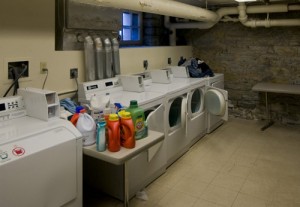
While living on campus the last three years, I’ve had my fair share of struggles. I’ve shared bathrooms, lost room keys, had my shoes stolen and been put through early morning fire alarms in the dead of winter. And that was just my sophomore year. But throughout my on-campus experience, there’s one task that’s always been a constant struggle: doing my laundry.
To put it bluntly, the laundry facilities on campus are not up to par. If you want to see for yourself, go check out the basement of Brady Hall. It’s not exactly Suds America. There never seem to be enough open washers and dryers in the residence halls – and most of the time, machines are broken or need repairs.
So when I heard St. Thomas was charging for laundry next year, I felt the same as every other student planning to live on campus: ticked off. What did we do to deserve this? Why could they possibly want more of our money?
Now, as much as I hate to say this, I was wrong. I was wrong to think St. Thomas was trying to nickel-and-dime students. The new laundry program is more of a reward than a punishment, and that’s something students need to understand.
Under the new program, Residence Life hopes to replace 10 to 20 washers and dryers per year starting next fall. That means in about 10 years, the majority of the washers and dryers on campus will be either fixed or replaced with more efficient machines.
Upgrading to more efficient machines will help lower St. Thomas’ energy costs, one of the main goals in overhauling the laundry program. After all, St. Thomas uses tuition dollars to pay for the energy bills on campus. By cutting down on energy costs, the university could put that extra money toward something more productive and beneficial for students, such as improving the cafeteria food.
The new program will also help save energy by limiting students’ card swipes to six per week. Many students think this is unfair, but they need to look at the bigger picture. Is having an unlimited amount of swipes per week the best use of energy resources? Is it responsible from an environmental standpoint? I think not. Unless you roll around in the dirt everyday, I don’t think you’ll need to wash your clothes more than three times a week.
By now you might be saying, “All of that sounds great, but I just don’t have the extra money to pay for laundry.” Well, a portion of the 2010 room and board rates will fund the new laundry program. So, just as your room and board rate covers cable, Internet, electricity and water, it will also cover laundry.
You might also find yourself blurting out, “That’s just an excuse to raise the costs of living on campus.” But just like every year, the room and board rates will rise to cover the increased cost of running the residence halls. The increase in room and board rates is actually being kept lower than usual for 2010. Room fees will rise 3.7 percent and board fees will increase 3 percent. In 2009, room rates increased 4 percent, while board fees increased 3.5 percent.
Residence Life Director Aaron Macke said, “Over time, I think most people will come to see this made sense.” And I agree with him. It does make sense. The university has made a sensible decision to improve laundry facilities and sustainability throughout campus. As students who want to see this university improve, we should be thanking the fine folks who made this decision, not bashing them.
Miles Trump can be reached at mttaylorjohn@stthomas.edu.


